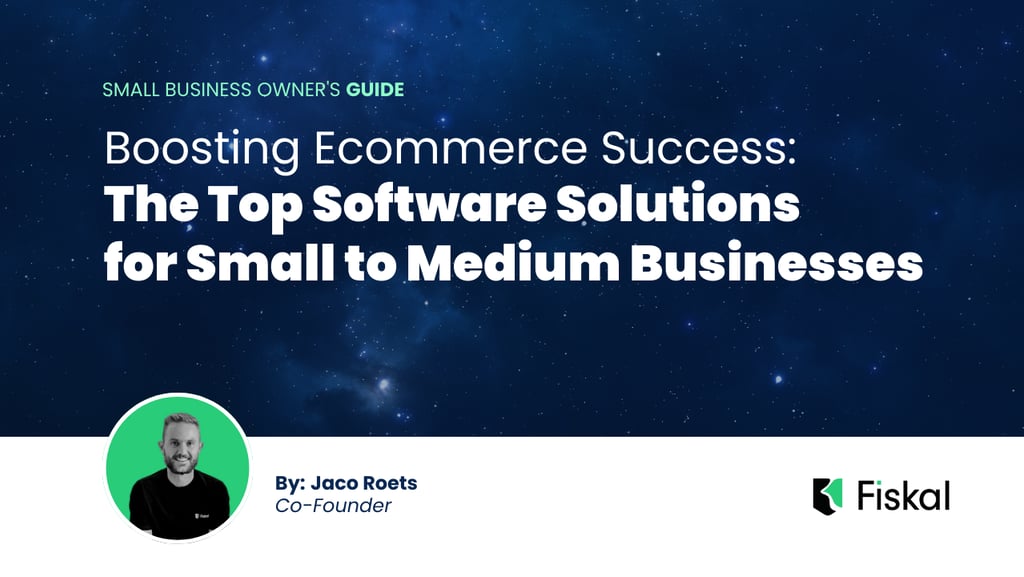Boosting Ecommerce Success: The Top Software Solutions for Small to Medium Businesses
In an increasingly digital world, small- to medium-sized businesses are capitalizing on the global reach of ecommerce. But with intense competition and evolving customer expectations, finding the right software solution to optimize their online presence is crucial. Enter the top software solutions specifically catered to the needs of these businesses. From inventory management to marketing automation, these tools are designed to streamline operations, attract customers and boost sales. But with a plethora of options available, how do you choose the best software for your business? That's where this article comes in. We've done the research and compiled a comprehensive list of the top software solutions for small- to medium-sized businesses. Whether you're seeking an intuitive e-commerce platform or a robust customer relationship management tool, we've got you covered. Join us as we explore each software solution's key features, benefits and user reviews. Discover how these tools can transform your business operations and help you achieve ecommerce success. With the right software solution, you'll be equipped to stay ahead of the competition and meet the demands of today's digital-savvy consumers.
SYSTEMS AND SOFTWARE


Benefits of Using Ecommerce Software
In the fast-paced world of ecommerce, utilizing specialized software can significantly enhance the performance of small to medium-sized businesses. One of the primary benefits of ecommerce software is its ability to streamline operations. By automating tasks such as inventory management, order processing and customer service, businesses can save time and reduce human error. This automation not only enhances efficiency but also allows business owners to focus more on strategic initiatives rather than getting bogged down by routine tasks. This operational efficiency can lead to increased productivity and ultimately, higher sales.
Another critical advantage of ecommerce software is improved customer experience. With tools designed for personalization, businesses can tailor their offerings to meet individual customer needs. Features such as targeted email marketing, product recommendations based on browsing history and easy-to-navigate interfaces contribute to a more engaging shopping experience. Happy customers are more likely to return, leading to better customer retention rates and increased lifetime value. In a competitive marketplace, providing an exceptional shopping experience can be the differentiating factor that sets a business apart.
Additionally, ecommerce software can provide valuable analytics and insights. Many platforms come equipped with built-in reporting tools that allow businesses to track sales performance, customer behavior and inventory levels. This data-driven approach enables informed decision-making, helping businesses to adapt their strategies based on real-time information. Whether it's identifying popular products or understanding peak shopping times, these insights can drive marketing efforts and inventory management, ensuring that businesses remain agile in the ever-changing ecommerce landscape.
Factors to Consider When Choosing Ecommerce Software
When selecting the right ecommerce software for a business, several key factors must be carefully evaluated. First and foremost is the scalability of the software. As a business grows, its needs will inevitably evolve. Therefore, it’s crucial to choose a solution that can accommodate increased traffic, an expanding product line or additional sales channels without compromising performance. A scalable platform will not only support current operations but also provide room for future growth, making it a wise long-term investment.
Another important consideration is user-friendliness. The software should be intuitive enough that both the business owner and their team can navigate it with ease. A steep learning curve can lead to frustration and reduced productivity. Ideally, the software should offer a simple setup process and an accessible dashboard, allowing users to manage their ecommerce activities effectively. Furthermore, excellent customer support and extensive documentation can also enhance the user experience, ensuring that businesses receive assistance whenever needed.
Lastly, budget plays a significant role in software selection. While it may be tempting to choose the most feature-rich option available, it's essential to analyze the overall cost against the potential return on investment. Different platforms have various pricing structures, including subscription fees, transaction fees and hidden costs. Businesses should consider their current financial situation and future financial goals when making a decision. A solution that provides essential features at an affordable price point may often be a better fit than a more expensive option with features that are not immediately necessary.
Top Ecommerce Software Solutions in the Market
The ecommerce landscape is replete with various software options tailored to the unique needs of small to medium-sized businesses. Each platform offers distinct features, making it imperative for businesses to conduct thorough research to find the right fit for their specific requirements. Among the most popular options are Shopify, WooCommerce, BigCommerce, Magento and Volusion. These platforms have carved out their niches in the market, each providing various functionalities aimed at enhancing the online selling experience.
Shopify stands out as one of the most user-friendly platforms available. It offers a comprehensive suite of tools that cater to businesses of all sizes, making it a popular choice among entrepreneurs. Shopify’s ease of use is complemented by a wide array of customizable templates, making it accessible even for those with limited technical expertise. Additionally, Shopify is known for its seamless integration with various payment gateways and shipping services, further simplifying the ecommerce process.
WooCommerce, on the other hand, is an open-source plugin for WordPress that allows businesses to transform their websites into fully functional online stores. Its flexibility is one of its primary selling points, making it ideal for those already familiar with WordPress. WooCommerce is highly customizable and offers an extensive range of plugins that can enhance functionality based on the unique needs of a business. This adaptability makes it a popular choice among small to medium-sized enterprises looking for a tailored solution.
Shopify: A Comprehensive Review and Guide
Shopify has emerged as one of the leading ecommerce platforms, particularly favored by small to medium-sized businesses. Its user-friendly interface allows anyone, regardless of technical expertise, to set up an online store quickly. Shopify offers a 14-day free trial, which is an excellent opportunity for businesses to explore the platform without any financial commitment. During this trial, users can experiment with different themes, product listings and payment options, making it easier to understand how the platform can meet their specific needs.
One of the standout features of Shopify is its extensive app store, which includes thousands of applications that can enhance the functionality of an online store. From marketing tools to inventory management systems, businesses can easily integrate various applications to create a customized experience. Shopify also excels in its payment processing capabilities, offering Shopify Payments alongside multiple third-party payment gateways, ensuring smooth transactions for customers. Additionally, the platform provides robust SEO features, allowing businesses to optimize their online presence and attract more organic traffic.
Customer support is another area where Shopify shines. Users have access to 24/7 support via live chat, email, and phone. This level of assistance is invaluable, especially for new entrepreneurs who may encounter challenges while setting up their stores. Moreover, Shopify’s extensive documentation, including tutorials and community forums, provides additional resources for users, ensuring they can find answers to any questions that may arise. This combination of user-friendly features, customization options and strong support makes Shopify a top choice for businesses looking to establish a successful online presence.
WooCommerce: A User-Friendly Ecommerce Solution
WooCommerce is an incredibly popular ecommerce solution among small to medium-sized businesses, primarily due to its seamless integration with WordPress. This open-source plugin allows users to transform any WordPress site into a fully functional online store, offering a cost-effective solution for those already invested in the WordPress ecosystem. With a plethora of themes and extensions available, WooCommerce enables businesses to create a customized online shopping experience tailored to their unique branding and customer needs.
One of the key advantages of WooCommerce is its flexibility. Unlike many hosted solutions, which can be restrictive, WooCommerce provides extensive customization options. Businesses can modify their online stores by adding various functionalities through plugins. From advanced shipping options to payment gateways, WooCommerce can adapt to almost any business model. Additionally, the platform is equipped with built-in analytics, allowing users to track sales and customer behavior effectively, which is crucial for data-driven decision-making.
Another significant benefit of WooCommerce is its cost-effectiveness. While the plugin itself is free, businesses may incur costs for specific themes or extensions. However, compared to other ecommerce platforms, WooCommerce can often provide a more affordable route to establishing an online store. Furthermore, the active community surrounding WooCommerce means that users can find a wealth of resources, tutorials, and forums dedicated to troubleshooting and optimizing their ecommerce experience. This supportive community adds an additional layer of reassurance for businesses venturing into the online marketplace.
BigCommerce: Scalable and Feature-Rich Ecommerce Platform
BigCommerce is a robust ecommerce platform that has gained traction for its scalability and feature-rich offerings. It is designed to accommodate businesses at various stages of growth, making it an ideal choice for small to medium-sized enterprises looking to expand. One of the standout features of BigCommerce is its extensive built-in capabilities, which include advanced SEO tools, multi-channel selling options and comprehensive reporting features. These tools empower businesses to not only create an online presence but also optimize their operations for maximum efficiency and reach.
The platform is particularly noted for its scalability. Unlike some other solutions that may struggle under increased traffic, BigCommerce is built to handle high volumes of sales seamlessly. This resilience makes it suitable for businesses experiencing rapid growth or those that expect to scale in the future. Additionally, BigCommerce offers various customizable templates that are mobile-responsive, ensuring that online stores look great across all devices, which is crucial in today’s mobile-centric world.
Moreover, BigCommerce is committed to providing exceptional customer support. Users have access to 24/7 support via live chat, email, and phone, as well as an extensive knowledge base filled with tutorials, webinars and community forums. This level of support is essential for businesses that may require assistance during their ecommerce journey. With its combination of scalability, built-in features and robust support, BigCommerce proves to be an excellent choice for businesses committed to achieving long-term success in the ecommerce space.
Magento: An Open-Source Solution for Advanced Customization
Magento is a powerful ecommerce platform that stands out for its advanced customization capabilities. As an open-source solution, it allows businesses to tailor their online stores to meet their specific needs, making it a popular choice for those with technical expertise. Magento’s flexibility allows for extensive modifications, enabling businesses to create unique shopping experiences that resonate with their target audience. This level of customization can lead to increased user engagement and, ultimately, higher conversion rates.
One of the key features of Magento is its scalability. The platform can handle large volumes of products and traffic without compromising performance, making it suitable for growing businesses and enterprises. Magento also provides robust SEO features, which are crucial for online visibility. With built-in tools for optimizing product pages and category structures, businesses can improve their search engine rankings and attract more organic traffic.
However, it’s important to note that while Magento offers a wealth of features and customization options, it may not be the most user-friendly solution for everyone. The platform requires a degree of technical knowledge to fully leverage its capabilities. Businesses without in-house technical expertise may need to consider hiring developers or agencies to assist with setup and ongoing maintenance. Despite this potential hurdle, for those who can harness its power, Magento offers an unparalleled level of flexibility and control, making it a compelling choice for advanced ecommerce operations.
Volusion: A Budget-Friendly Option for Small Businesses
Volusion is an ecommerce platform designed with small businesses in mind, offering a budget-friendly solution for those looking to establish an online presence without breaking the bank. With various pricing tiers, Volusion provides options that cater to businesses at different stages of growth. Its straightforward pricing structure means that users can anticipate their expenses without encountering hidden fees, making it an attractive choice for startups and entrepreneurs.
One of the primary advantages of Volusion is its user-friendly interface. The platform offers a simple setup process, allowing users to launch their online stores quickly. With numerous templates and customization options available, businesses can create a visually appealing and functional online store without needing extensive technical knowledge. Additionally, Volusion includes built-in tools for managing inventory, processing payments and analyzing sales performance, streamlining essential ecommerce operations into one cohesive platform.
Volusion also places a strong emphasis on customer support. Users have access to 24/7 customer support via live chat, email, and phone, ensuring that assistance is readily available whenever challenges arise. Moreover, Volusion’s extensive knowledge base and community forums provide additional resources for users seeking answers to common questions. This combination of affordability, ease of use and strong support makes Volusion an appealing option for small businesses navigating the ecommerce landscape.
Conclusion: Choosing the Right Ecommerce Software for Your Business
Selecting the right ecommerce software is a pivotal decision for small to medium-sized businesses aiming to thrive in the competitive online marketplace. Each platform discussed—Shopify, WooCommerce, BigCommerce, Magento and Volusion—offers unique features and benefits that cater to different business needs. It is essential for entrepreneurs to assess their specific requirements, including scalability, user-friendliness and budget, to make an informed choice that aligns with their long-term goals.
Ultimately, the right ecommerce software can significantly impact a business's success. By streamlining operations, enhancing customer experience and providing valuable insights, these platforms empower entrepreneurs to focus on growth and innovation. As the digital landscape continues to evolve, investing in the right tools will not only help businesses stay ahead of the competition but also meet the ever-changing demands of today's consumers.
In conclusion, as you embark on your ecommerce journey, take the time to explore the various software solutions available. Each platform has its strengths and weaknesses and finding the right fit for your business will require careful consideration and research. With the right ecommerce software, your business will be well-equipped to navigate the challenges of the digital marketplace and achieve lasting success.












